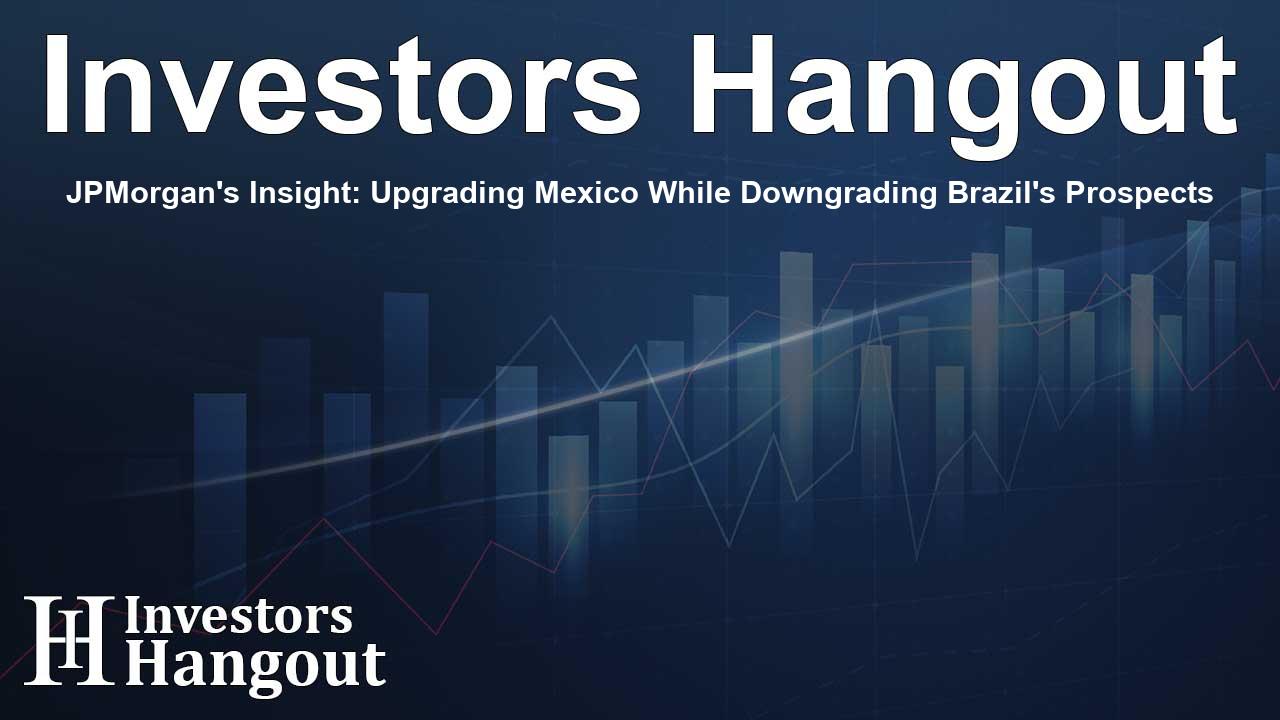JPMorgan's Insight: Upgrading Mexico While Downgrading Brazil's Prospects

JPMorgan's Strategic Upgrade of Mexican Equities
Leading investment firm JPMorgan has made a significant move by upgrading Mexican equities from "neutral" to "overweight." This strategic decision comes on the heels of encouraging growth indicators from the U.S. economy, which have positively impacted Mexican consumers.
How U.S. Growth Affects Mexican Investors
According to JPMorgan strategist Emy Shayo Cherman, robust growth in the U.S. is providing vital support to Mexican consumers, largely through remittances. Additionally, a weaker Mexican peso (MXN) appears to be enhancing the purchasing power of remittances, further stimulating the local economy.
The Relationship Between U.S. and Mexican Economies
Cherman noted the strong correlation between Mexican and U.S. industrial production, highlighting how economic activities in one nation can reverberate in the other. This interconnectedness underscores why the Mexican market is benefiting from positive shifts in the U.S. economy.
Downgrading Brazilian Equities: What It Means
In contrast, JPMorgan has downgraded its outlook for Brazilian equities from "overweight" to "neutral." This decision arises from concerns about slower growth in China, the world's second-largest economy, which can lead to lower commodity prices. Brazil, as a primary soy exporter, stands to be significantly affected by any downturn in Chinese demand.
The Impact of Tariff Policies
Moreover, the incoming U.S. administration has stirred concerns with proposed tariff increases on imports from Mexico and Canada. These tariffs are perceived as a potential threat to trade relations and, consequently, to Brazil’s economy. The anticipated tariffs could introduce further volatility in markets heavily influenced by international trade dynamics.
The Role of Central Banks in Market Performance
Central bank policies in both countries are also under scrutiny. Brazil's central bank may continue to implement rate hikes into the coming years, which could negatively impact corporate earnings. Meanwhile, Mexico’s central bank is expected to pursue a more accommodative monetary policy, which could foster growth in that market.
Comparing Latin American Performance
Both Brazilian and Mexican equity markets have faced challenges this year. Brazil's MSCI index, for example, has slumped by 23% since the beginning of the year. In comparison, Mexico's index has seen a decline exceeding 28%. These performances starkly contrast with the broader MSCI emerging market equity index, which has recorded a modest gain of over 6%.
Looking Ahead: Monitoring Mexican Markets
JPMorgan remains cautiously optimistic about Mexico. The investment firm acknowledges the necessity for careful monitoring of ongoing developments, particularly regarding institutional reform, which is cited as a significant risk factor. The continuing evolution of these markets will be crucial in determining the future investment landscape.
Frequently Asked Questions
Why did JPMorgan upgrade Mexican equities?
JPMorgan upgraded Mexican equities due to strong U.S. growth positively influencing Mexican consumers through remittances and increased purchasing power.
What factors led to the downgrade of Brazilian equities?
The downgrade stemmed from slower growth in China, which is expected to reduce commodity prices and impact Brazil's economy negatively.
How do U.S. tariffs affect Mexico and Brazil?
Proposed U.S. tariffs may threaten trade relations, affecting both economies by potentially increasing costs for imports and diminishing growth prospects.
What is the impact of central bank policies on equity markets?
Central bank policies significantly influence equity markets; Brazil's expected rate hikes could hurt corporate earnings, while Mexico's easing policy could stimulate growth.
How have Latin American equity markets performed this year?
Latin American equity markets have struggled, with significant declines in Brazil and Mexico compared to modest gains in the broader MSCI emerging market index.
About Investors Hangout
Investors Hangout is a leading online stock forum for financial discussion and learning, offering a wide range of free tools and resources. It draws in traders of all levels, who exchange market knowledge, investigate trading tactics, and keep an eye on industry developments in real time. Featuring financial articles, stock message boards, quotes, charts, company profiles, and live news updates. Through cooperative learning and a wealth of informational resources, it helps users from novices creating their first portfolios to experts honing their techniques. Join Investors Hangout today: https://investorshangout.com/
Disclaimer: The content of this article is solely for general informational purposes only; it does not represent legal, financial, or investment advice. Investors Hangout does not offer financial advice; the author is not a licensed financial advisor. Consult a qualified advisor before making any financial or investment decisions based on this article. The author's interpretation of publicly available data shapes the opinions presented here; as a result, they should not be taken as advice to purchase, sell, or hold any securities mentioned or any other investments. The author does not guarantee the accuracy, completeness, or timeliness of any material, providing it "as is." Information and market conditions may change; past performance is not indicative of future outcomes. If any of the material offered here is inaccurate, please contact us for corrections.